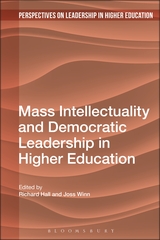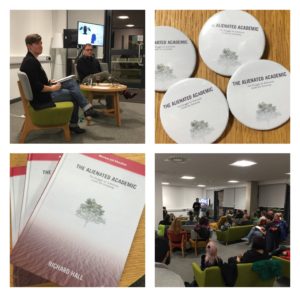On Wednesday I spoke at a Leadership in Learning and Teaching programme event at the Durham Centre for Academic Development. I was asked to share my experience of working to embed inclusivity in the curriculum, and framed what I said/our discussions around:
- policy and institutional change;
- participants’ perspectives on embedding inclusivity in the curriculum;
- two DMU examples of institutional change projects relating to disability (Universal Design for Learning (UDL)) and work to close the attainment gap (Freedom to Achieve); and
- participant engagement with DMU’s UDL framework.
I utilised our UDL2 project interim evaluation report and UDL2 literature review, alongside our Freedom to Achieve interim evaluation report.
I also made contextual reference to DMU’s access and participation plan, submitted to the Office for Students for 2018/19, and pointed participants to Durham’s plan. These highlight the differences across the sector between intake, upon which approaches to inclusivity/diversity (whatever they mean) rest.
My slides are available below. I have also appended some of the key points that emerge from our discussions. Finally, I append a limited number of resources, which I find particularly useful or challenging.
Key points from participant discussions
Q. What are your experiences of working to embed inclusivity in the curriculum?
- Issues around the pace of change, and who has responsibility when so much activity is devolved.
- What is the meaning of these terms, and in particular in different disciplinary contexts and at different levels of study?
- What is the relationship between strategy, policy and practice? Here, issues of curriculum development and curriculum delivery, pivoting around curriculum Design, pointing towards assessment and feedback are surfaced. There needs to be discussion about institutional, departmental and subject-specific agendas, in order to avoid the impact of hidden or unconscious curriculum intentions.
- There are issues of workload that need to be considered.
- How do we encourage sharing across disciplinary boundaries and separations created by different workloads/roles/job types?
- We recognise a range of cultural expectations, including the expectations of students attending different institutions with different histories, cultures, practices, forms of capital. We also recognise a range of expectations in relation to employability and the generation of new skills, competencies and knowledge.
- We recognise the need to create a lingua franca, through which we can generate a shared approach to communication. However, this needs to be sensitive to different expertise and experience, and the ways in which language can affect interpretation and activity. Our aim is to avoid unnecessary friction, whilst supporting and scaffolding our students’ struggles to master the curriculum.
- Is it possible to avoid simply retrofitting a physical or curricula infrastructure, and to build something that celebrates diversity and inclusivity (whatever they are)?
- There are competing pressures upon staff in relation to career, Department and institution, and in terms of student experience/support. There are competing pressures upon staff in relation to research, teaching and administration. How do search innovation projects relate to academic progression?
- How do we decide what is valued and who is valued in our approaches to innovation? How do we engage with new workload models in this process?
- We have more agency than we think, and are able to shift the emphasis of the curriculum, in order to focus content and activity upon previously marginalised areas of study. In this way, we can begin to ask questions about privilege and power, and centre new individuals/groups. In this way we can also approach problems differentially, and enabling students to take ownership.
- In terms of having a framework for inclusive practice, at the level of curriculum design, delivery and assessment/feedback, there is interest in the concrete practices of particular subjects (as opposed to more abstract or open-ended frameworks). How might this work in different disciplinary contexts? As a result, is it possible to move beyond the threshold engagement with inclusivity/diversity, in order to do more?
References
Ahmed, S. 2012. On Being Included: Racism and Diversity in Institutional Life. Durham, NC: Duke University Press.
Ahmed, S. 2017. Living a Feminist Life. Durham, NC: Duke University Press.Barnett, R. 2016. Understanding the University: Institution, Idea, Possibilities. London: Routledge.
Bhambra, G., Gebrial, D., & Nisancioglu, K. (Eds., 2018). Decolonising the University. London: Pluto Press.
Connell, R. 2013. “The neoliberal cascade and education: an essay on the market agenda and its consequences.” Critical Studies in Education 54 (2): 99-112.
De Sousa Santos, B. (Ed., 2007). Cognitive Justice in a Global World: Prudent Knowledges for a Decent Life. New York: Lexington Books.
O’Dwyer, S., S. Pinto, and S. McDonagh. 2017. “Self-care for academics: a poetic invitation to reflect and resist.” Reflective Practice 19 (2): 243-49.
Steinþórsdóttir, F. S., Heijstra, T. M., & Einarsdóttir, Þ. J. (2017). The making of the ‘excellent’ university: A drawback for gender equality. ephemera: theory and politics in organization, 17(3), 557-82.
Styres, S. (2018). Literacies of Land: Decolonising Narratives, Storytelling, and Literature. In L. Tuhiwai Smith, E. Tuck, & K.W. Yang (Eds.), Indigenous and Decolonizing Studies in Education: Mapping the Long View (pp. 24-33). London: Routledge.
Tuck, E., & Yang, K. W. (2012). Decolonization is not a metaphor. Decolonization: Indigeneity, Education and Society, 1(1), 1-40.
Tuhiwai Smith, L., Tuck, E., & Yang, K. W. (Eds., 2018). Indigenous and Decolonizing Studies in Education: Mapping the Long View. London: Routledge.

